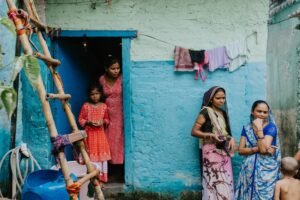
In 2022, Sayli’s* life took a devastating turn. At just 16, she was sexually assaulted and forced to ingest an acidic substance, leaving her unable to swallow solid food due to severe corrosive damage to her pharynx, oesophagus, abdominal wall and stomach. Over the next two years, Sayli endured three major surgeries. While grappling with unimaginable physical pain, she had to shoulder the overwhelming task of addressing her medical and legal needs alone. She was never presented before a Child Welfare Committee (CWC), and was deprived of crucial psychosocial support.
The trajectory of her case changed during a bail hearing before the Delhi High Court, when the court appointed Sowjhanya Shankaran, iProbono India’s panel lawyer, as amicus curiae (friend of the Court). Recognising the complexity of Sayli’s situation, Sowjhanya referred her to iProbono India for holistic support.
“Sayli was like no other child victim I had met. She was resilient and determined to bring her perpetrators to justice, but she needed a team that could guide her through the legal process,”
– says Sowjhanya.
iProbono India’s Comprehensive Intervention
Our team immediately intervened by accompanying Sayli to hospital to address her ongoing medical needs. While Sayli had received financial relief under existing victim compensation schemes for acid attack survivors, it fell short of covering her extensive nutritional and medical expenses. iProbono India provided immediate financial assistance, while seeking additional compensation from the High Court.
A Landmark Judgment and Systemic Reform
In court, Sowjhanya was supported by our panel lawyer Kartikeye Dang and the our programs team. Justice Ohri awarded additional compensation of Rs. 4 lakhs, and recognising the urgent need for a specific scheme for rehabilitation of acid attack survivors, referred the matter to the Chief Justice.
At this stage, we provided in-depth legal research to establish that Sayli’s injuries were caused by acid ingestion, and Sowjhanya made detailed arguments substantiating the need for a more comprehensive and diverse approach to meeting the needs of acid attack survivors, with a streamlined disbursement mechanism. As a result of these joint efforts, the ‘Avlamban Fund Scheme 2024’ – a 10 crore fund to support acid attack survivors in Delhi, was created by the division bench comprising Chief Justice Manmohan and Justice Manoj Kumar Ohri. This scheme clearly defines what constitutes “acid” and “acid attack,” addressing a critical gap in the existing framework. Additionally, the scheme’s utilisation of funds has been expanded beyond medical expenses and surgeries to include aftercare, diet, and rehabilitation-related expenses such as education and vocational training. Unlike the existing Aasra Scheme, which is limited to survivors with external burn injuries, the Avlamban Fund Scheme ensures comprehensive support to all acid attack survivors. These pivotal changes ensure a more inclusive and supportive framework for acid attack survivors, paving the way for a life of dignity.
Ongoing Support
Our team continues to provide crucial emotional support to Sayli, and has helped her resume her education through National Institute of Open Learning (NIOS). We are also representing her in her trial court case against the accused.
Sayli’s courage has been a source of inspiration throughout this journey. Today, she is focusing on her healing, education, and future aspirations, supported by counseling and legal assistance from iProbono India. “Working with the iProbono India team has shown me the profound impact of a holistic approach to justice,” Sowjhanya reflects. “Their unwavering commitment to Sayli’s case, from securing enhanced compensation to ensuring additional criminal charges against her perpetrators, has been instrumental.”
Sayli’s story underscores the importance of a compassionate, multifaceted approach to justice that addresses the legal, medical, and emotional needs of survivors. The Avlamban Fund Scheme stands as a testament to what can be achieved when resilience meets systemic reform, offering hope to countless survivors who deserve a chance to rebuild their lives. Read the full judgment here.
*Name changed to protect privacy.












